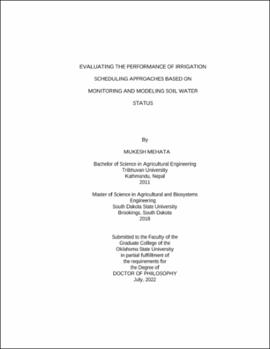| dc.contributor.advisor | Taghvaeian, Saleh | |
| dc.contributor.author | Mehata, Mukesh | |
| dc.date.accessioned | 2023-04-05T16:21:05Z | |
| dc.date.available | 2023-04-05T16:21:05Z | |
| dc.date.issued | 2022-07 | |
| dc.identifier.uri | https://hdl.handle.net/11244/337301 | |
| dc.description.abstract | Improving irrigation management through adopting scientific irrigation scheduling offers a great potential for optimizing irrigation applications and reducing water withdrawals. However, adoption of scientific irrigation scheduling approaches in irrigated agriculture is limited. More research and investigations are needed to demonstrate the performance and effectiveness of different irrigation scheduling approaches under variable soils, crops, and climatic conditions. The objectives of the research were to: (1) evaluate the performance of a multi-sensor capacitance probe in determining soil water content and field capacity, (2) study the effects of soil data accuracy on irrigation scheduling using a soil water balance model for different crops and climatic conditions across western Oklahoma, and (3) investigate the impact of variable soil data and root water uptake distributions on multi-layer soil water status and irrigation parameters simulated by a vadose-zone water transport model. The performance of a commercially available probe and its six calibrations provided by the manufacturer revealed how each calibration performed differently depending on clay and salinity levels. Evaluation of two sensor-based approaches in determining field capacity showed that both approaches were unreliable and highly sensitive to variations in soil texture and layers, irrigation systems, and irrigation management. Investigation of soil data accuracy using a soil water balance model revealed that easily obtainable web soil survey data may have relatively large impacts on irrigation recommendations at field scale, whereas the impacts could be small at regional scale. Evaluation of a vadose-zone model using variable soil data and root water uptake distributions, as model inputs demonstrated the importance of using accurate input data in irrigation scheduling models to achieve improvements in irrigation management. | |
| dc.format | application/pdf | |
| dc.language | en_US | |
| dc.rights | Copyright is held by the author who has granted the Oklahoma State University Library the non-exclusive right to share this material in its institutional repository. Contact Digital Library Services at lib-dls@okstate.edu or 405-744-9161 for the permission policy on the use, reproduction or distribution of this material. | |
| dc.title | Evaluating the performance of irrigation scheduling approaches based on monitoring and modeling soil water status | |
| dc.contributor.committeeMember | Weckler, Paul | |
| dc.contributor.committeeMember | Mirchi, Ali | |
| dc.contributor.committeeMember | Byrd, Seth | |
| osu.filename | Mehata_okstate_0664D_17835.pdf | |
| osu.accesstype | Open Access | |
| dc.type.genre | Dissertation | |
| dc.type.material | Text | |
| dc.subject.keywords | irrigation demand | |
| dc.subject.keywords | soil water balance | |
| dc.subject.keywords | soil water sensor | |
| dc.subject.keywords | SSURGO | |
| dc.subject.keywords | volumetric water content | |
| dc.subject.keywords | web soil survey | |
| thesis.degree.discipline | Biosystems Engineering | |
| thesis.degree.grantor | Oklahoma State University | |
